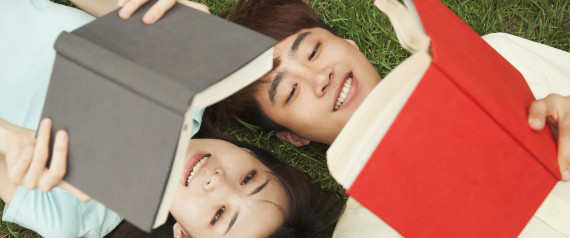
Allow me to set the scene (a luxury that can be afforded by novels and short stories, but is often skipped over in their weird and much more economical counterparts, poems):
You're at a bar! You notice some interest from the guy standing a few feet away, who is handsome, in a Michael Cera sort of way. You shrug and approach to say hello. "Hello!" you say. "Hello!" he says, and you proceed to discuss juice cleanses and the latest issue of The New Yorker. He asks what you do, and you tell him. You ask what he does, and he tells you, but then coughs and mumbles under his breath, "but-really-my-main-focus-right-now-is-my-poetry." Did you hear him correctly? You did? Oh, okay, that is totally cool. Except that, in spite of the fact that you consider yourself a pretty well-read person, you know absolutely nothing at all about poetry.
Don't panic! Here are a few tips to help you understand, or at least sound like you understand, the basics:
Him: Oh, you like poetry, too? What a massive relief. Normally when I tell people I enjoy and also write poetry, they roll their eyes and walk away. So tell me, what do you know about poetry?
You: Allow me to start with the basics. Poetry is a little different than other forms of creative writing. For one thing, poems these days are often a lot shorter than novels (although, of course, this wasn't always the case, and there are contemporary exceptions). For this reason, they focus more on diction, or careful word choice, and patterns. The way poetry sounds when read aloud is as important as the themes or visual imagery.

Him: Totally. I feel like playing as the drummer in my band, Dear Bear, has helped me gain a better understanding of both homonyms (see: band name) and rhythm. If you want, you should come see us play on Thursday.
You: That might be okay! But let's backtrack: you said something about rhythm. Merriam-Webster defines rhythm as "a regular, repeated pattern of sounds or movements." In poetry, this manifests itself as stressed and unstressed words or syllables. Stressed syllables sound longer, and unstressed syllables sound shorter. Combine different variations of stressed and unstressed syllables, and you have feet. Varying arrangements of feet within a line or sentence are called meters. Also, not to sound pedantic or whatever, but "deer" and "dear" are not actually homonyms.
Him: You're right. That's all completely true.

You: I know! So let's continue: There are a whole bunch of types of meters. Perhaps the most common is iambic pentameter, which isn't as confusing as it sounds. It's a ten-syllable line, consisting of five feet, each with one stressed and one unstressed syllable. When read aloud, it sounds a little bit like a heartbeat: "ba DUM ba DUM ba DUM ba DUM ba DUM."
Him: Shall I compare thee to a summer's day?
You: If you want to! Moving on: Iambic pentameter was super-popular in Shakespeare's day, but a lot has happened in the poetry world since then. A couple centuries later, the Romantic poets, like John Keats, William Wordsworth, Lord Byron, etc., made it popular to write poems filled with sensual imagery, often in the form of odes. They also reflected on how crazy nature can be sometimes. Keats in particular was an innovative guy -- he introduced the concept of negative capability, which champions mystery over fact and reason. In doing so, he arguably inspired modernism.
Him: Yeah! Modernism!
You: Yeah! Modernism! Some really great modernist poets include T.S. Eliot, whose book-length poem, "The Waste Land" is filled with historical allusions, and William Carlos Williams, who experimented with lineation by adding line breaks in unexpected places, like this:
I have eaten
the plums
that were in
the icebox
Him: Why would you go and do a thing like that?
You: Because, they were delicious, and so sweet, and so cold. Anyway, Williams went on to influence some people called the Beat Generation. Many of them, including Allen Ginsberg, wrote poems in free verse, which the Oxford English Dictionary defines as, "poetry that does not rhyme or have a regular meter." The modernists also influenced the postmodernist and surrealist poets like e.e. cummings (note the unconventional orthography).
Him: I kind of want to do to you what spring does to the cherry trees right now.
You: (Aside) To strive, to seek, to find, and not to yield.
